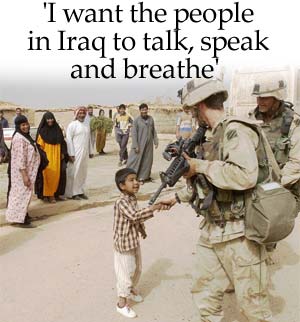
Sitting at the back of the prayer hall, far enough from the Imam's mimbar so that he would not disturb anyone's prayers, Dr Ahmed Aziz thumbed through his black prayer beads rapidly, and spoke with a loud voice.
But he was not praising Allah; instead he was damning Saddam Hussein, and with such vigor that one thought if the Iraqi dictator were to appear before him, Aziz would garrote him with those same beads.
"I hope they catch Saddam Hussein and cut him to pieces," hissed Aziz who fled Baghdad in 1995 after his brother was killed and another jailed. "He is a bastard, a killer, a criminal, a thug of the first class. Uneducated farmer. He is worse than Hitler."
Finally free to express their thoughts without doubt about Iraq, it was a day of mixed emotions for Shiites at the Imam Al-Khoei Islamic Center in Queens.
Only a day before, they saw US Marines and Baghdad residents tear down a giant statue of Saddam Hussein in the heart of the city, and they rejoiced with them in spirit, thousands of miles away.
There was still expressed relief that Iraq's Shiites, who were brutally oppressed under Hussein's regime, would finally be able to live in peace.
"I am happy that an evil dictator is gone, and there will be freedom for people," said Syed Zaidi, a high school student. "There should be freedom in Iraq like we have here."
But worshippers' spirits were dampened when they learned that their revered leader, Sheikh Abdel Majid al-Khoei, was murdered by a mob April 10 in Najaf, inside one of Shiite Islam's holiest shrines, the Imam Ali mosque.
"Today is a very sad day, may Allah bless him," eulogized a visiting Imam who came to speak at the center's Thursday night gathering. "He not only dedicated his life for servitude to Allah, he also served the needs of the people."
Al-Khoei's picture was placed around the mosque, including the blue and white tiled walls behind the Imam. "His service will continue, and his memory will stay in our hearts," he said.
With the Imam's murder, there were more questions about the future of the country.
"It seems that the war on Muslim people is not over, it has just begun," said Salman Syed, a student who thought Saddam loyalists were behind the killing. He predicted there would soon be fighting between Sunnis and Shias in Iraq.
Aziz and his Iraqi friends downplayed such fears. "I hope not," said one. "We are above those things."
They were more concerned about the current lawlessness in the major cities, and hoped that order would be restored soon to the country.
"Most of the people there are poor, they think the government stuff belongs to them," Aziz said.
"They also want revenge," said Namir Ansari, a friend of Aziz's.
Aziz agreed. "The average person in Iraq hated Saddam Hussein," he said, counting himself among them.
He explained he had to leave the country after doctors were ordered to amputate people by presidential decree. "They started cutting hands, ears, and asked us physicians to take part in such brutalities," he said.
That's why he was quick to brush off news that the rest of the Arab world was upset to see Hussein's regime collapse so quickly. "Those people are not Iraqis," he said. "They have not suffered like we have for 34 years."
"This is a blessing, without American help, we would not have had this opportunity in 100 years," Aziz said, to the nodding agreement of his friends.
What he and his compatriots wanted to see in their homeland was peace, and a chance for people there to live normal lives.
"I just want the people in Iraq to be able to talk, and speak, and breathe," said Aziz.
His friend, a balding, thin man wary enough that he did not want to be named, felt similarly. "Yes, to be able to breathe the air in Iraq," he said. "There was no air."
Photograph; Getty Images. Design: Dominic Xavier





 © 2025
© 2025